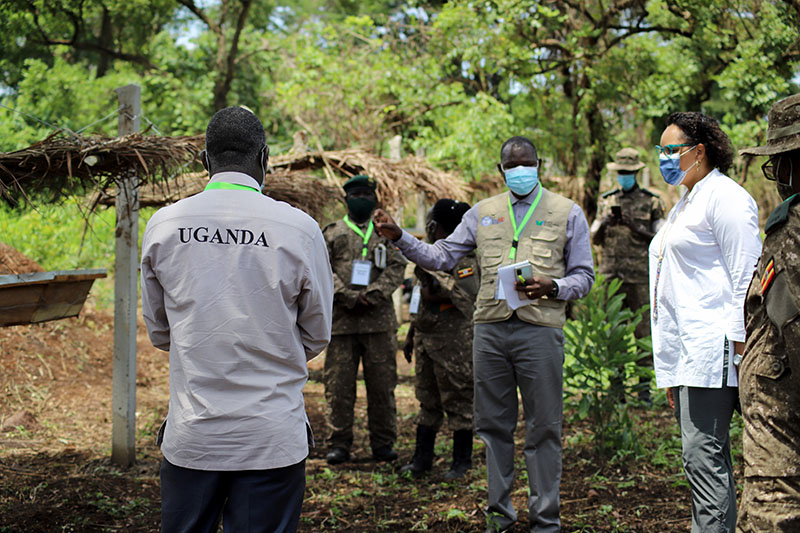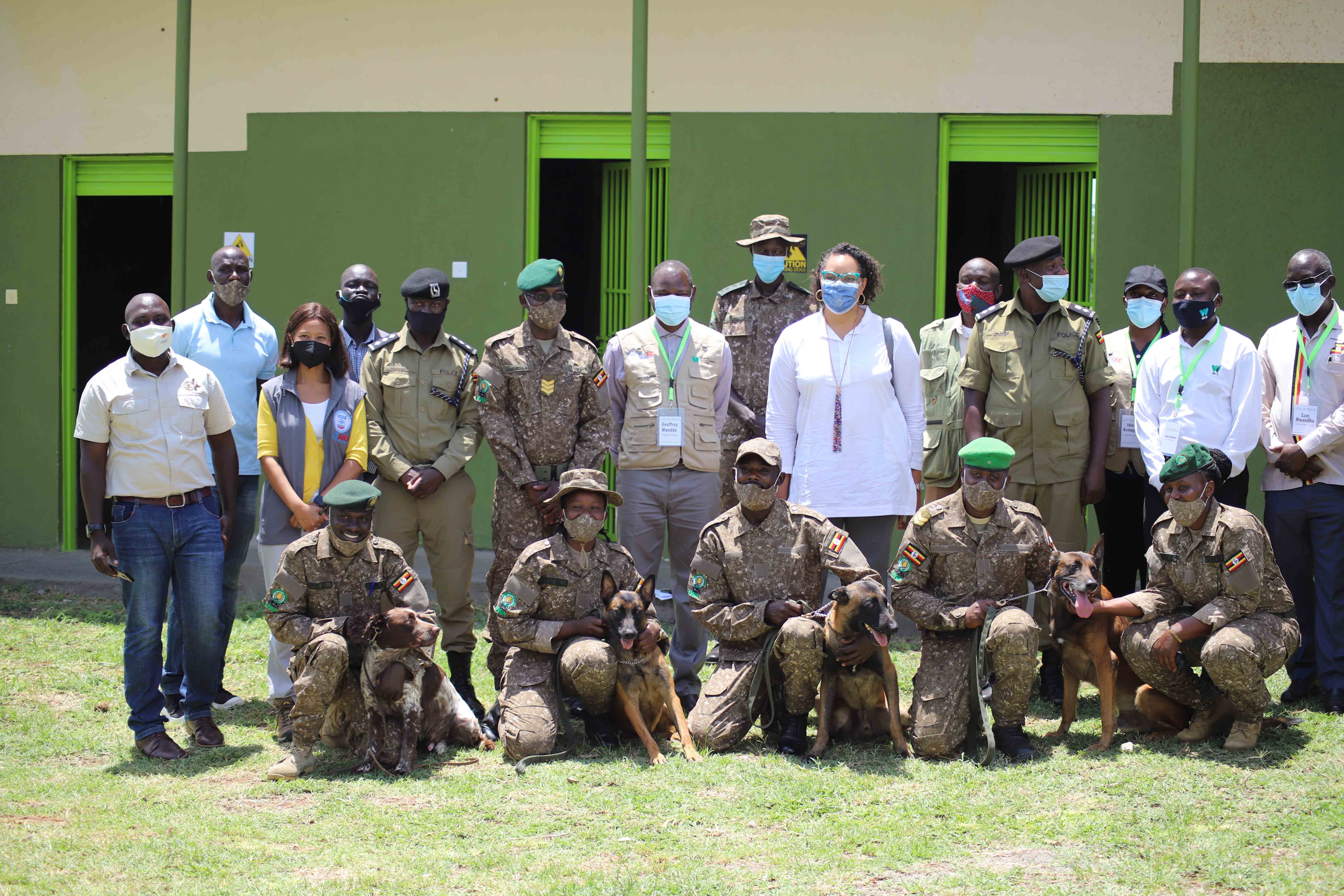UGANDA, April 22, 2021 On Tuesday, April 20, 2021, the United States Ambassador to Uganda, Her Excellency Natalie Brown and her delegation visited the USAID/Uganda Combating Wildlife Crime (CWC) Activity at Karuma Wildlife Reserve in Murchison Falls Conservation Area. The activity, implemented by Wildlife Conservation Society (WCS) in partnership with African Wildlife Foundation (AWF), Natural Resource Conservation Network (NRCN) and the Royal United Services Institute (RUSI) aims to reduce wildlife crime in Uganda by strengthening the capacity of CWC stakeholders to detect, deter and prosecute wildlife crime. This is through close collaborations with key stakeholders, including Uganda Wildlife Authority (UWA) that manages the Murchison landscape and other conservation areas in Uganda; security and law enforcement agencies; private sector companies; and communities living adjacent to wildlife protected areas.

| U.S. Ambassador, H.E. Natalie Brown (on right), Sam Mwanda (with back to camera) and UWA staff listen to Geoffrey Mwedde, Chief of Party of USAID/Uganda CWC Activity (centre) explaining how the beehive fence works to deter elephants from crossing to communities. |
The Ambassador and her delegation visited Can Tung Tung (meaning there is a lot of poverty) beekeeping group found in Kololo-Telaboke village, one of three beekeeping groups that CWC is supporting to establish a beehive fence along a section of the Karuma Wildlife Reserve boundary. This initiative aims to reduce human-elephant confrontations; improve food security by preventing crop raids; and improve community livelihoods by increasing production levels of various bee products. “We were harvesting few kilograms of honey, but with the extra bee hives, we hope to harvest more honey (that costs between UGX 8,000 (US$2.2) and UGX 10,000 ($US2.8) per kilogram) and other bee products, including beeswax, royal jelly, venom and propolis. We would like to thank USAID for making this possible,” said Rajab Mohammed (chairperson of Can Tung Tung beekeeping group). Rajab also narrated how elephants have been deterred from crossing into the community, although the hives are yet to be colonized. The beehives once colonized, will provide better deterrence when the elephants come into contact with fence line and swing the hives, releasing swarming bees that will sting the elephants and cause them to run away. In light of this initiative, the Ambassador applauded the community for their positive response to wildlife, highlighting the goal that the support from the American people hopes to achieve. “The investment from the American people aims to help communities lead the lives that they want to live so that you and your families are safer, more secure and healthier. We are excited to see your beekeeping project because you are finding a balance between safeguarding wildlife and safeguarding your families and livelihoods. I am happy that there is now a solution — a win-win situation — that keeps elephants contained; protects your families; and provides you with other sources of income. “The wildlife of Uganda is highly recognized worldwide. It is one of Uganda’s treasures and a source of pride for the country. I applaud you for your resourcefulness and commend you for your dedication; and I wish you sweet success”, added the Ambassador.
The Ambassador and her delegation also visited the UWA Canine Unit supported by CWC Activity, where they witnessed a K-9 demonstration to understand how dogs are being used to detect wildlife contraband. She also witnessed the great care and attention that the handlers give the dogs. “This demonstration highlights that to be successful, there are so many pieces of the puzzle that have to fit together — great dog handlers, funding and resources, UWA, Police, legislation and the judiciary”. The Ambassador further appreciated WCS, AWF, UWA and all stakeholders for protecting Uganda’s wildlife, safeguarding populations by addressing human-wildlife conflict and impeding wildlife trafficking.
Geoffrey Mwedde, Chief of Party of the USAID/Uganda Combating Wildlife Crime Activity pointed out the need for a multi-pronged approach to tackle wildlife crime. “Wildlife crime happens at different levels. It involves different categories of people with varying ‘push and pull’ factors of motivation. Therefore, to effectively address wildlife crime, we need to use a multi-faceted approach targeting different groups with different interventions. We are grateful that the American people through USAID have made it possible for us to intervene at community level and also be able to tackle traffickers head-on through support to UWA and other government agencies” he said.

| The U.S. Ambassador, H.E. Natalie Brown (with a necklace) together with Geoffrey Mwedde, Chief of Party, USAID/Uganda CWC Activity (to the left(L) with the dog handlers (squatting) at the canine unit supported by the Activity. Also present were: Sam Mwandha, UWA Executive Director (standing far right (R) Simon Nampindo, WCS Country Director (2nd R) Superintendent Ondoga Jonny, DPC of Kiryandongo District (3rd R); Detective Sergeant Kabarangira Mann, Commander of UWA Canine Unit (4th L) Regina Burns Mackenzie, Director- Economic Growth Office (2nd L) Abdullatif Mwanja, Technical Advisor of the Canine Unit (standing far L); and Robert Senkungu, AWF Program Manager (in the back row with red mask) |
| U.S. Ambassador, H.E. Natalie Brown (on right), Sam Mwanda (with back to camera) and UWA staff listen to Geoffrey Mwedde, Chief of Party of USAID/Uganda CWC Activity (centre) explaining how the beehive fence works to deter elephants from crossing to communities. |
| U.S. Ambassador, H.E. Natalie Brown (on right), Sam Mwanda (with back to camera) and UWA staff listen to Geoffrey Mwedde, Chief of Party of USAID/Uganda CWC Activity (centre) explaining how the beehive fence works to deter elephants from crossing to communities. |